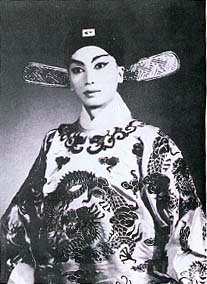 Shi Pei Pu, the inspiration of David Henry Hwang‘s acclaimed play, M. Butterfly, was reported by the New York Times to have died recently at the age of 70 years in Paris.
Shi Pei Pu, the inspiration of David Henry Hwang‘s acclaimed play, M. Butterfly, was reported by the New York Times to have died recently at the age of 70 years in Paris.
Shi Pei Pu and his lover, Bernard Bouriscot, an accountant working for the French embassy in Beijing, were convicted by France in the mid 1980s for espionage after Bouriscot was caught giving French documents to the Chinese after the Chinese government found out about the affair between the two men. According to Shi, however, Bouriscot was led to believe that Shi was actually female first by claiming that he was actually a woman forced to live as a boy by his family. Later as the affair became sexual, Shi kept up the charade by hiding his genitalia and always having sex with Bouriscot in the dark, even showing Bouriscot a 4 year-old boy who Shi claimed to be their son. Bouriscot and Shi were both arrested for espionage by the French when Bouriscot tried to bring Shi to France even though Bouriscot openly had a male partner. Howvever after Bouriscot learned in prison that Shi was actually male and had deceived him for decades, he attempted suicide. Bouriscot has lived as a laughingstock ever since, especially since people have wondered, “How could he not know his lover was male for decades?”
Hwang takes this bizarre story in M. Butterfly as a way to explore various themes that have always been dominant in Asian American literature: the exoticizing of Asia to Europe and the US, otherwise known as Orientalism; gender roles and expectations of both Asian American men and women; and finally it was one of the first Asian American literature pieces to openly talk about queerness. Hwang brilliantly turns the question of, “How can Bouriscot not know that his lover was male?” on its head, and fires back to the audience, “Does it really matter if his lover was male?” It also explores the question of what white men are falling for when they take Asian lovers, male or female: are they falling for their lovers because of who they are, or is it because of what they represent?
I’ve always loved reading the play, and it was one of the first pieces of literature I taught when I taught Asian American literature at UCSB and SFSU back in the day because it explores these questions so brilliantly. Unfortunately, the movie is something that’s always given me headaches. I have heard that the DVD of this movie just came out, so I’ll have to see if I can actually watch this movie without getting a headache or throwing the DVD out the window.







